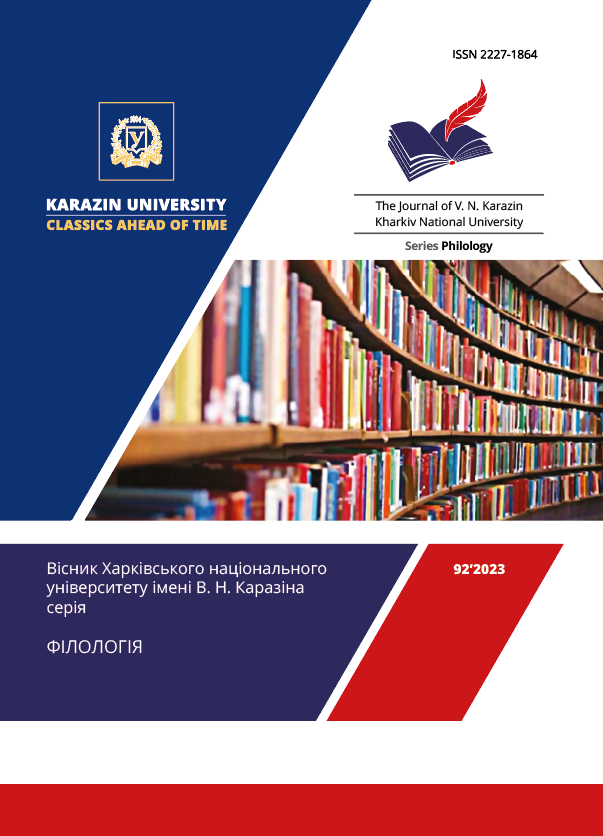Communicative tactics of self-presentation of the addresser in Lesya Ukrainka's epistolary discourse
Abstract
The article examines the communicative tactics of the addresser's self-presentation in Lesya Ukrainka's epistolary discourse. The study of letters belonging to one and the same linguistic personality, in the unity of linguistic and extralinguistic factors of text creation, makes it possible not only to learn about the facts of the biography of the author of the letters, but also to penetrate into the work of thinking, the mechanisms of communicative activity. This is the reason for the relevance of this investigation.
The purpose of the article is the analysis of communicative tactics that implement the general communicative strategy of self-presentation in Lesya Ukrainka's epistolary discourse.
The main tactics are: 1) self-characterization, in which the author of the letters describes her appearance, character, intellectual properties, physical and emotional state; 2) characteristics provided by other people, real or imagined; 3) comparison herself with other people; 4) comparison of different hypostases of one's personality; 5) self-identification by national identity; 6) self-identification through social and professional status; 7) self-identification through social and family ties; 8) self-nomination in the signature as a component of the end of the letter; 9) evaluation of one's own communicative activity; 10) formulation of own life principles; 11) description of her lifestyle, daily activities, household chores; 12) philosophical understanding of one's existence.
Thus, Lesya Ukrainka uses various communicative tactics of self-presentation in her letters to various persons. These tactics form pragmatic, semantic[1]structural and linguo-stylistic integrity within the framework of a single communicative strategy. The self-presentation of the author of the letters reflects her linguistic personality as a communicatively active, reflective, self-ironic, self-critical person who needs communication and self-realization in the field of literary creativity. The prospects for further research are linked to the analysis of the selection of communicative tactics depending on the specifics of the addresser and other extralinguistic factors.
Downloads
References
Bohdan, S. K. (1994). "To someone beloved, and dear, and glorious..." (Semantic and syntactic phenomenon of Lesya Ukrainka's letters to Olga Kobylyanska). Dyvoslovo, no. 2, pp. 15‒19 [in Ukrainian].
Bohdashyna, O. (2021). Relations between Lesya Ukrainka and Elena Pchilka in family correspondence. The ideologue of the national aristocracy (in honor of the 150th anniversary of the birth of Lesya Ukrainka): a collection of scientific works based on the materials of the all-Ukrainian scientific and practice conference with international participation of February 25– 26, 2021, Lviv, pp. 277–283. URL: https://dspace.hnpu.edu.ua/handle/123456789/8619 (accessed 27 March 2023) [in Ukrainian].
Iermolenko, S. (1999). "...Your poetess was Ukrainian!" (reading Lesya Ukrainka's letters). Essays on Ukrainian literature (stylistics and language culture). Kyiv, pp. 155‒161 [in Ukrainian].
Issers, O. S. (2008). Communicative strategies and tactics of Russian speech. Moscow: LKI Publishing House. 288 p. [in Russian].
Kabiri, M. Kh. (2013). Self-presentation as a strategy of professional discourse. Karazin readings: Man. Language. Communication: theses of reports of the 12th scientific conference with international participation (Kharkiv, February 1, 2013). Kharkiv, pp. 129–130 [in Ukrainian].
Karpova, K. S. (2017). Linguistic portrait of a culinary blogger. Linguistic and conceptual pictures of the world. Issue 59, pp. 82‒89 [in Ukrainian].
Kosmeda, T., Kovalevska, O. (2021). Egocentrism of borrowings and letters of Lesya Ukrainka: verbalization of Polish linguistic culture. Slavia orientalis. Vol. 70, no. 4, pp. 873‒888. DOI: 10.24425/slo.2021.138872 [in Ukrainian].
Kosovets, M. V. (2022). Communicative tactics of the strategy of self-presentation in the English-language detective story. Language, no. 37, pp. 89‒94. DOI: 10.18524/2307–4558.2022.37.261457 [in Ukrainian].
Kuzmenko, O. Yu. (2018). Peculiarities of verbalization of self-representation strategy (on the material of modern English-language interviews of popular magazines). Actual problems of modern linguistics and methods of teaching language and literature: materials of the online conference (Zhytomyr, February 7–11, 2017). Zhytomyr: ZhDU Publishing House named after Ivan Franko, pp. 64–69 [in Ukrainian].
Kur'yanovich, A. V. (2006). The cognitive essence of the speech genre is self-presentation in the epistolary discourse of M. I. Tsvetaeva. Bulletin of the Tomsk State Pedagogical University. Issue 5 (56), pp. 144–150 [in Russian].
Mikheyev, M. Yu. (2007). Diary as an ego-text (Russia, XIX–XX). Moscow: Vodoley Publ. 264 p. [in Russian].
Nevska, Yu. (2017). Epistolary discourse as a reflection of linguistic personality. Science and Education a New Dimension. Philology, 5 (39). Issue 143, pp. 45‒49 [in Ukrainian].
Necheporenko, L. (2007). Lesya Ukrainka's epistolary as a private document and a historical-literary source. Lesya Ukrainka and modernity: Collection of scientific works. Lutsk: Editorial and publishing department "Vezha" of the Volyn National University named after Lesya Ukrainka. Vol. 4(1), pp. 277‒283 [in Ukrainian].
Radziievska, T. V. (2018). Discursive spaces: historical-linguistic dimension: monograph. Kyiv: DP "Information and Analytical Agency". 323 p. [in Ukrainian].
Sviatovets, V. F. (1981). Epistolary legacy of Lesya Ukrainka: letters in the context of artistic creativity. Kyiv: Vyshcha shkola. 181 p. [in Ukrainian].
Ukrainka, Lesia (2021). Complete academic collection of works in 14 volumes. Vol. 11. Letters (1876‒1896). Lutsk. 600 p. [in Ukrainian].
Cheberyak, A. M. (2010). The "open letter" speech genre: communicative and pragmatic aspects of the organization (based on the material of the Ukrainian, Polish, and English languages). Cand. Thesis. Lviv, 255 p. [in Ukrainian].
Shvelidze, L. D. (2021). Linguistic means of implementing communicative strategies in the discourse of social networks (on the material of the Ukrainian and English languages). Cand. Thesis. / Donetsk National University named after Vasyl Stus. Vinnytsia, 240 p. [in Ukrainian].




